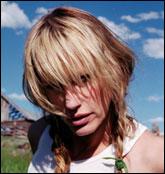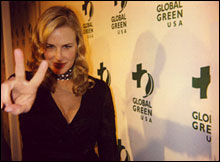
Daryl Hannah.
Courtesy dhlovelife.com.
The day started a long, long time ago, but Daryl Hannah’s got that laid-back, just-woke-up vibe — occasionally stumbling for a word, inserting a slow, easy laugh here and there. And who can blame her? She’s been working long nights shooting a film in Vancouver, B.C., about dirty cops. And on the weekends, she works on her new eco-video blog.
The willowy blond has more than 60 films to her credit, but she’s permanently etched in many people’s minds as the guileless mermaid in Splash. She surfaced more recently as a crackerjack one-eyed assassin-nurse in Kill Bill: Vol. I and II. And as much as she’s an icon in American cinema, she’s also become a key player in the environmental movement.
Sure, every celeb can give lip service to positive change, but Hannah actually spends most of her spare time walking the walk. The latest proof is her video blog, a series of five-minute films that offer snapshots of how people around the globe are helping each other, and the earth.
In the first spot, Hannah takes a lick off the gas cap of her 1983 biodiesel el Camino. The french-fry grease that powers it, she says, has a toxicity level “somewhere between table salt and maple syrup.” For another, she filmed her visit to Rwanda, where she encountered mountain gorillas — the country is home to the last 350 of the endangered creatures — and helped christen a village’s cisterns for World Water Day. A third video finds her profiling an organic vegan “junk food” joint. She plans to debut a new movie every Monday. Hannah says, “Basically, I’m trying to show a vision of an exciting and inspirational people.”
Grist caught up with Hannah in Vancouver. At the end of the interview, she stopped in mid-sentence to report that a giant bald eagle had swooped down, right over her head. She relayed it with awe, like a kid who’s wished for ice cream and suddenly sees the Mr. Softie truck.
You’ve really gone far and wide to find some of these subjects for your blog. Like Rwanda.
It’s not necessary to go far and wide. I mean, you can really find exciting and inspiring things within your hometown. I had an opportunity to go to Rwanda for World Water Day. I thought it would be such an incredible opportunity. But honestly, you totally find those things locally wherever you live.
You’ve turned into a documentarian, and you’ve turned into a journalist.
[Laughs.] I guess so. I made my first documentary when I was doing Dancing at the Blue Iguana [in 2000], and since August I’ve been working on another full-length one.
What’s been the hardest part of putting the short pieces together?
It’s a lot more involved than it looks for a little five-minute film. … I don’t actually have a real production company, I don’t actually have a [director of photography] and a sound person on salary, and I don’t have an actual crew. I’ve been using the same editor, thankfully, she’s been sticking with me, but I’ve been doing it full-on guerilla style. … I haven’t gotten any public sponsor or anything, because I don’t want to seem like I’m trying to sell any particular thing. I want it to have the integrity of something that is genuine and unbiased. So trying to do it on the fly is a little difficult.
Would you look for environmental partners?
It would be great to figure out a way for someone to say, “Yeah, I’d love you to keep doing these things, so here’s the money. Don’t worry, you don’t have to try to sell our product” or whatever. But I don’t really know how that works. I’ve never been good in the financial and business arenas. I handle the creative side of things.
Yeah, you’re the creative person. You have other people for that.
Well, I don’t have the people, but I hope that someone will take care of it at some point. I’m one of those people who figures that it will eventually sort itself out.
And apparently it does. You have a great thing going right now. Who is the biggest audience for your website?

Hannah at Global Green USA’s 2006 Oscar Party.
Photo: Jeremy Kost/WireImage.
We’ve been getting emails from all over the world. As far away as Papua New Guinea, all over Europe … it’s been very interesting, and one of the most satisfying things I’ve found is not only people who have been turned on to the subjects who weren’t aware of them, but also people who are kind of like me — who are making all their best efforts to live consciously and healthfully, and who have been sort of pessimistic about it, and to a certain extent, have been demoralized.
I’ve gotten emails from them and they’ve seen the blogs and it cheers them up, and it gives them hope that there are positive things happening — and that makes me feel really good.
In one year, what do you hope will happen with this project?
I’d like to be a giant enabler. I’d like to provide information, inspiration, and access to whatever goods and services are needed to make it super easy for everyone to change their lifestyle to a sustainable one.
What kinds of avenues have you taken in your own life to live consciously?
I try to improve in my own practices, but aside from my home being off the grid, and I haven’t been to a gas station in my own car in five years, I try to over carbon-neutralize myself for sure. … I have an organic garden at home. That’s a big goal of mine, to try and grow as much of my own food as possible.
Where do you live?
I’m in the Rockies. My house is bermed into the hillside, and so the front is all greenhoused in so I can grow indoors.
Does your ethic carry over into your film work as well?
You know, it depends. I wish I could, but there aren’t that many thematically aligned movies. Sometimes I’ll even do a movie because it’s a filmmaker, a cinematographer, an actor or somebody I want to work with [for creative reasons]. Filmmaking is such a collaborative medium. Sometimes it’s a character you want to play or a story you want to tell. Sometimes it’s just to pay the bills.
What else is important for people to know?
Your audience is pretty well-versed on most of these issues, but for the mainstream culture, to let them know to change out their household cleaning products, or their utilities or their light bulbs, those basic things can make such a huge difference. And then of course, obviously as far as issues such as global warming, something has to be done on the corporate side, there has to be some mandate or some legislation [to keep corporations from polluting].
Do you feel more helpless or more powerful?
That’s the thing. I really struggle with that feeling of helplessness. That’s why I really try to get my blogs, and even myself, to point to the positive and look at all the inspiring things that are happening.
Now I actually do feel hopeful, because I feel like more people are open to this thought process than ever. And I know that the younger generation is doing things that are so ingenious. And for them it’s not a matter of a political belief or an environmental stance. It’s really just common sense. I really think that’s what it should have come down to a long time ago.
Doesn’t it seem to you that things are kind of synergistic right now and people are opening up to these concepts? I think that’s really exciting.

